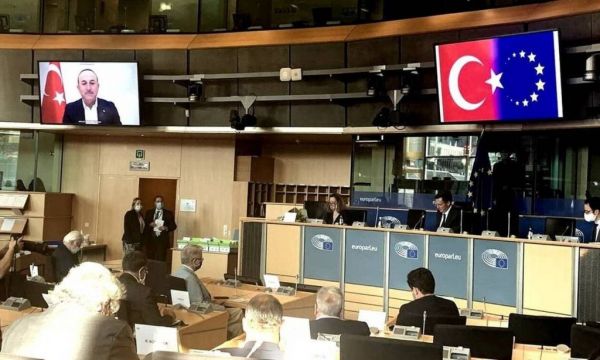The absence of the previously noisy United States is making itself felt all over the world and is bringing dormant conflict back to life. Without a dominant power that quickly suppresses regional ambitions with a credible threat, old and new conflicts easily flare up. The domestic chaos created by the corona crisis in many countries makes this period even more susceptible to risky foreign adventures. Especially if the potential referees themselves are fiddling with rearranging regional relations, or too busy with domestic problems.
The skirmishes between India and China, China's ambitions for power in its own region and - closer to home - the European Union's intricate relationship with Turkey, Russia and the US fit into the picture of dormant conflicts flaring up. Sometimes, intentionally or unintentionally, energy suddenly plays a leading role.
We see this in the increasingly complicated and with more politically peppered Nordstream 2 dossier, the pipeline to transport gas from Russia to Germany. And we see that in the battle over the possibly gas-rich territorial waters between Greece and Turkey. Germany is increasingly in the position to (temporarily) call off the commissioning of the Nordstream 2 pipeline at the very last moment. While the EU is committed to a successful Green Deal and tries to organize the flight to the front, it is often forgotten to mention that natural gas must indeed accommodate the transition from one energy system to another. But for many, transition fuel natural gas has become the backguard. This makes gas relations even more difficult, because gas is politically a thing of the past.
Relationship with Russia
For example, the German retirement of nuclear energy and coal in the next 15 years without a reliable gas supply is difficult to imagine, especially as long as the North-South electricity connections are not in order. The route through Ukraine and now Belarus adds additional political risk to the already deteriorating relationship between Germany and Russia. Due to internal divisions and different interests, the EU is struggling to get the gas relationship with Russia into calmer waters. It also opens the door to outside interference to conduct regional politics via the gas dossier.
In addition to the problems surrounding Nordstream 2, more gas unrest has arisen on the southeastern side of the EU in recent weeks. Gas relations with Turkey as a transit country - once the dream gas corridor for bringing Turkmen and Azerbaijani gas to the EU - had already been seriously disrupted. Of these earlier plans, only the Trans-Anatolian gas pipeline (TANAP) to Italy has come. The rest of these plans have largely died in political ugliness.
The discovery of gas in the Eastern Mediterranean and especially south of Cyprus has sparked long-standing conflicts over the territorial waters of Turkey and the Turkish part of Cyprus, which is recognized only by Turkey. At stake are the potential gas reserves in the east of the Mediterranean, south of Cyprus. It may not even be the potential gas reserves themselves that are re-igniting the conflict, it is much more about how the gas is brought to market.
Isolation Turkey
Egypt and Israel have joined forces and are exporting liquefied gas (LNG) to the world market. But recent major discoveries have led to new plans for a pipeline to Greece and then further into the EU. Turkey is thereby skipped and that hurts. Especially since the Turkish gas market has grown considerably in recent years and has become quite dependent on imports from Russia. The formation of the EastMed Gas Forum early this year by Cyprus, Egypt, Greece, Israel, Italy, Jordan and the Palestinian Territories has further isolated Turkey. As a cat in the corner, Turkey tries to attract some of the potential gas flows, so that the origin of gas imports for Turkey can become somewhat more balanced. The heavy reliance on Russian imports earned Turkey, like Germany, unpleasant American attention in December 2019.
With America's hot breath on its neck, the EU must find a way out for both flaring conflicts. European Commission President Ursula von der Leyen's statement that she heads the most geopolitical Commission may take on new meaning given the complex relations within the EU and with neighboring countries. Instead of shaping the geopolitical future itself, the EU seems to be becoming a plaything.
The economic consequences of the corona crisis are dire everywhere and are already causing enough headaches. A major crisis in the gas dossier could easily fuel centrifugal forces in the EU. Together with the European Council, the Commission should keep all the frogs in the wheelbarrow while ensuring that there are no accidents in terms of security of gas supply in the long transition to another energy system.
With a policy aimed at gas as a transition fuel, it was still possible to talk to the various parties in terms of common interest. But now that gas is seen by many countries in the unspoken role of back-guard, it is precisely its unpredictability that leads to unexpected risks.
Coby van der Linde is director of the Clingendael International Energy Program (CIEP) and (part-time) professor of geopolitics and energy at the University of Groningen. Reply via
expert@fd.nl.
https://fd.nl/opinie/1356575/eu-moet-leiderschap-tonen-om-regionale-gasconflicten-te-temperen
 ).
). ).
).



